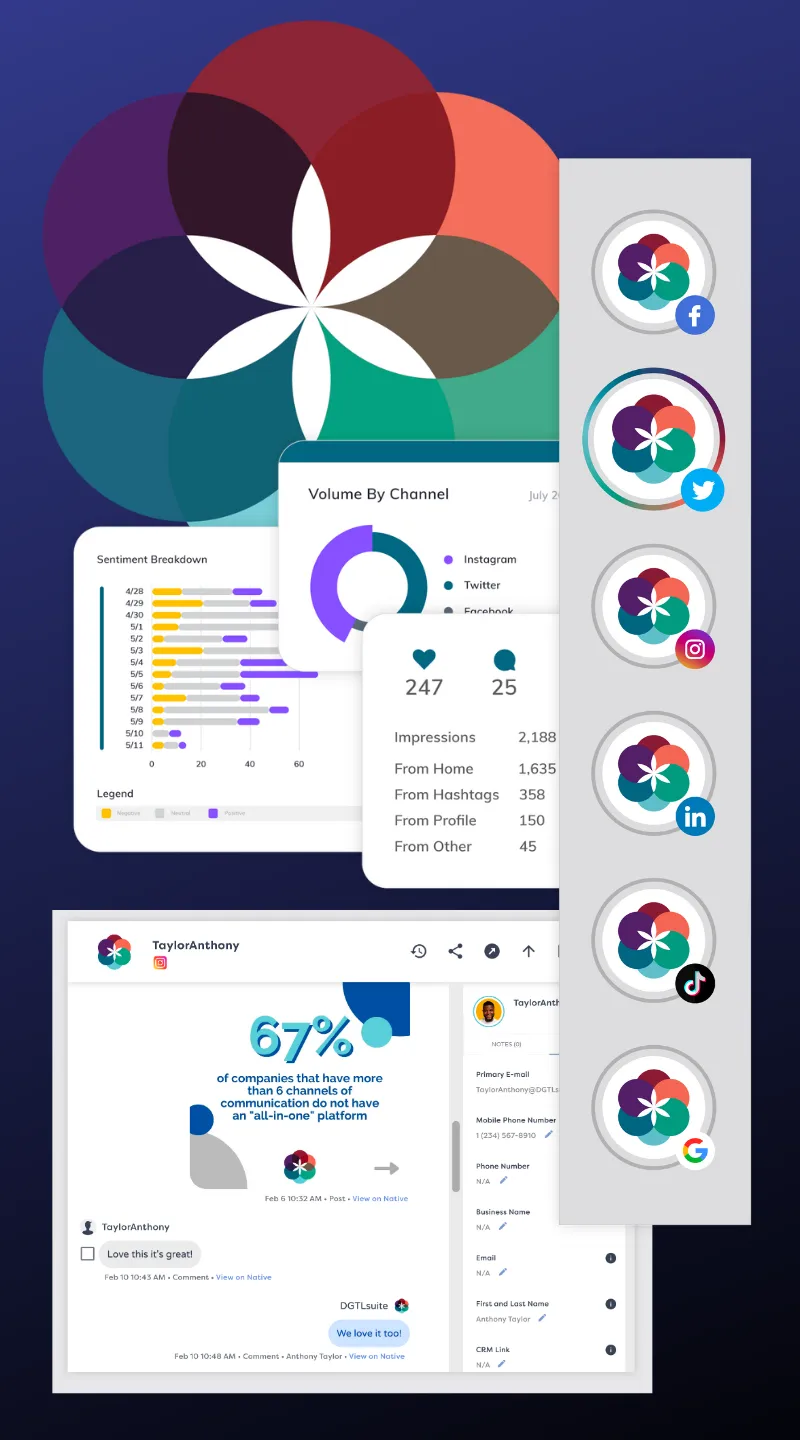Managing multiple social media accounts means more than just hitting “post.” Timing, strategy, and understanding what resonates with your audience all play a role.
As your social media presence grows, juggling a steady stream of posts and tracking performance can become overwhelming.
You need a way to reach the right people, maximize engagement, and stay on top of analytics—without spending all day doing it manually.
Social media scheduling tools and analytics platforms help streamline your workflow, keep everything organized, and make sure you’re making data-driven decisions to grow your online presence.
This guide covers the top 15 social media scheduling and analytics tools for 2025 to help you manage your content effectively.
What Are Social Media Scheduling and Analytics Tools?
Social media scheduling and analytics tools make it easier to manage your social media accounts.
These social media tools help you plan your social media posts in advance so you don’t have to publish content manually every day. Instead, you can schedule posts to go live at the best times so your social media platforms stay active without needing to be online constantly.
On the scheduling side, these tools let you create and queue posts for platforms like Instagram, Facebook, X (Twitter), LinkedIn, and more.
This is especially helpful for businesses or people who manage multiple social accounts at once. You can plan your content ahead of time and keep a consistent posting schedule.
On the analytics side, these tools track how your posts are performing. They provide important data, like how many people engage with your content, how fast your audience is growing, and which posts get the most attention.
This information helps you understand what’s working and what’s not so you can improve your future content.
Combining both social media scheduling and analytics, these tools save you time, keep you organized, and help you make smarter decisions for your social media strategy.
The Best Social Media Scheduling and Analytics Tools
Let’s dive into the six best social media scheduling tools, highlighting their key features, pros, cons, and pricing so you can choose the right one for your needs.
1. DGTLsuite
DGTLsuite is a powerful tool for social media management, offering solid social media scheduling features paired with advanced social media analytics.
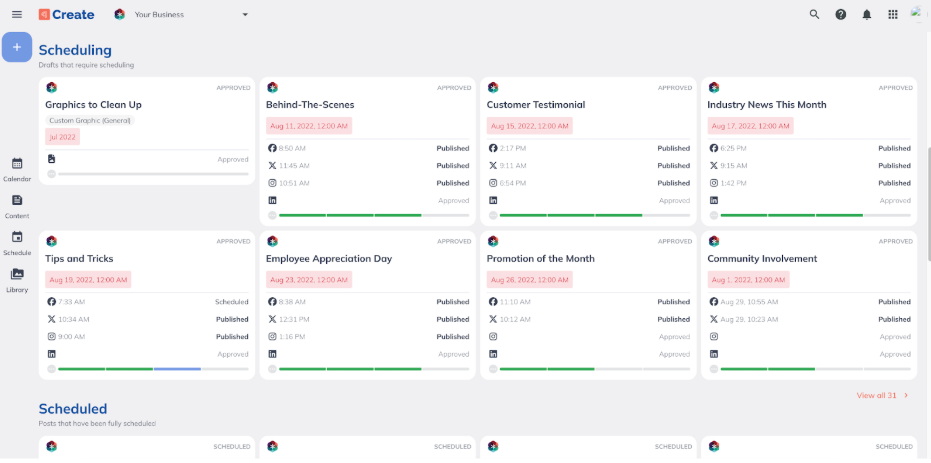
Whether you’re managing one brand or multiple social media accounts across various platforms, DGTLsuite provides an easy-to-use solution that saves time and helps boost engagement.
Key Features
- Multi-platform scheduling: DGTLsuite supports scheduling posts across major platforms like Instagram, Facebook, X, LinkedIn, and TikTok. You can plan social media posts in advance, keeping a steady social media presence without needing to be online around the clock.
- Advanced analytics dashboard: DGTLsuite goes beyond basic metrics, offering deep insights into engagement trends, audience growth, and social media post performance, allowing you to refine your social media strategy.
- Bulk scheduling: If you need to schedule social media posts in large quantities, DGTLsuite lets you upload and queue content in bulk, saving you hours of work.
- Content calendar: The drag-and-drop content calendar helps you visualize upcoming social media posts and align them with campaigns, promotions, or key events.
- Team collaboration: Assign tasks, posts, and responsibilities to team members to maintain a smooth workflow and ensure no missed deadlines.
- Social listening: Monitor brand conversations in real time, allowing you to engage with followers and address concerns as they arise.
Pros
- Offers detailed insights on audience demographics, engagement rates, and best posting times.
- Allows you to schedule and track performance across multiple social networks from one dashboard.
- Generates tailored reports to help businesses measure campaign effectiveness.
- Lets you schedule a large volume of posts at once, streamlining content planning.
- Features an intuitive dashboard that makes social media management easier for teams of all sizes.
- Enables seamless teamwork with role-based permissions and task assignments.
- Helps identify trends and optimize your content strategy based on performance data.
Pricing:
DGTLsuite offers flexible pricing plans designed for businesses of all sizes. Whether you’re an individual, a small team, or a large enterprise, there’s a plan to match your social media management needs.
Single User Plans
- Create Only: Includes 1 user and 2 connected social accounts for $9/month, ideal for individuals focusing on content creation and scheduling.
- Engage Only: Provides 1 user and 2 connected social accounts for $29/month, designed for those prioritizing customer engagement and interaction management.
- Basic: Offers 1 user and 5 connected social accounts for $59/month, a great choice for small businesses needing both content creation and engagement tools.
Team Plans
- Pro: Includes 1 user and unlimited connected social accounts for $179/month, with additional users available for $99 per user/month, making it a strong option for growing teams.
- Business: Provides 1 user with multi-brand support and unlimited connected social accounts for $299/month, with additional users at $199 per user/month, built for larger organizations managing extensive social media operations.
All plans come with a 7-day free trial and a 30-day money-back guarantee. Visit the DGTLsuite Pricing Page for more details.
2. Hootsuite
Hootsuite is a social media management tool offering a wide range of features for scheduling posts and analyzing performance.
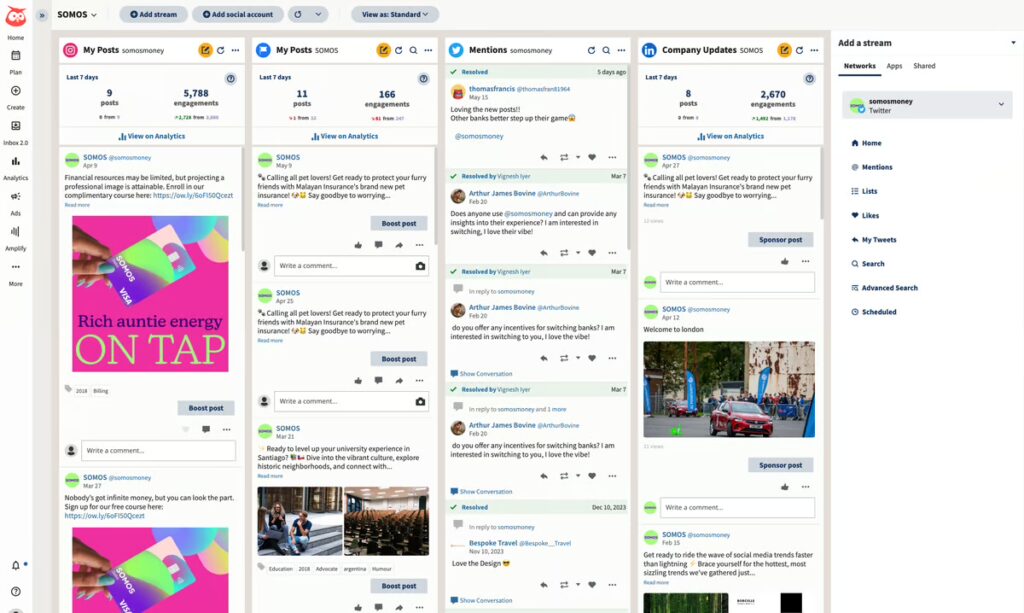
Image Source: Hootsuite.com
It’s known for its reliability and is used by businesses of all sizes.
Key Features
- Cross-platform scheduling: Hootsuite lets you schedule posts across Facebook, Instagram, X, LinkedIn, YouTube, and more. It even offers auto-scheduling for optimal posting times.
- Analytics: Hootsuite provides detailed performance insights, helping you track engagement, follower growth, and campaign success with custom reports.
- Team collaboration: Collaborate easily by assigning tasks and reviewing content before it’s published.
- Social listening and monitoring: Monitor keywords, hashtags, and brand mentions in real time, staying on top of what’s being said about your business.
- Content calendar: Hootsuite’s calendar offers a clear view of your scheduled content, helping you keep a consistent posting schedule.
Pros
- Offers granular insights, helping you track and optimize your social media performance.
- Connects with hundreds of third-party apps like Slack, Trello, and Canva, making it easy to collaborate and create content.
- Despite its robust features, Hootsuite’s interface is simple enough for both beginners and experts.
Cons
- Hootsuite’s advanced tools, like team collaboration and custom social media analytics, come at a higher price point, which might be expensive for smaller businesses.
Pricing
Hootsuite’s pricing begins at $99 per month for a single user. For small teams, the cost starts at $249 per month, covering up to three users. Additionally, they offer custom pricing plans tailored to enterprise needs.
3. Buffer
Buffer is a straightforward tool that is used among small businesses and startups.
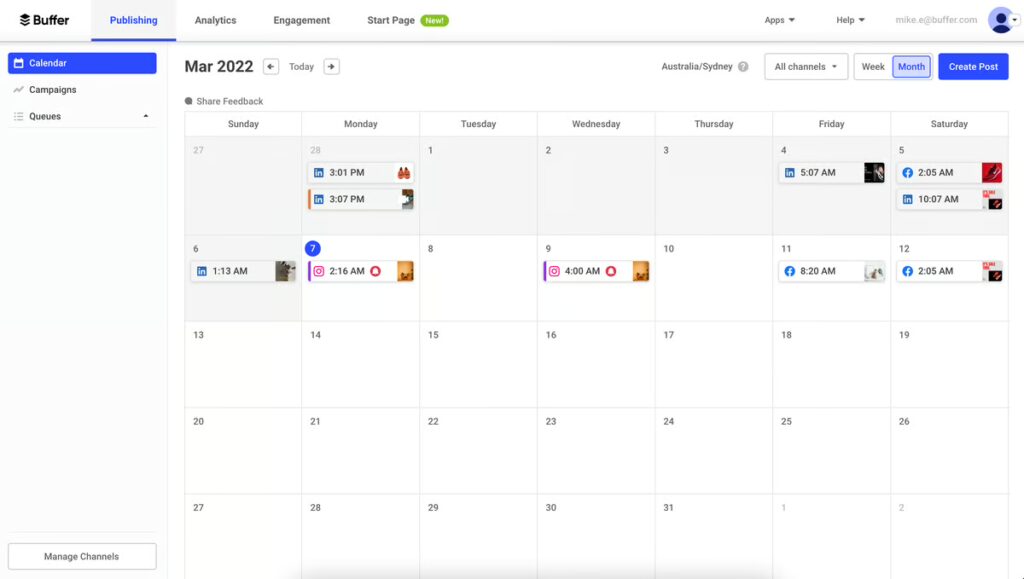
Image Source: Buffer.com
It’s known for its simplicity and affordability, which makes it easy to plan content and measure performance without being bogged down by too many features.
Key Features
- Post scheduling: Buffer supports scheduling posts for multiple social media accounts, including Instagram, Facebook, X, LinkedIn, and Pinterest, making it easy to plan social media posts in advance.
- Visual content calendar: Buffer’s calendar shows all your scheduled posts in one place. It also has a “Best Time to Post” feature to help you publish posts when engagement is highest.
- Basic analytics: Buffer tracks basic metrics like engagement rates, audience demographics, and social media post performance to help you gauge your social media strategy’s effectiveness.
- Content suggestions: Buffer offers content ideas based on trends, helping you keep your social media channels fresh.
Pros
- Easy to use, even for those with limited experience managing social media tasks.
- Offers some of the most budget-friendly plans, making it accessible for small businesses or freelancers.
- Buffer integrates with Canva so you can create and schedule content seamlessly.
Cons
- Buffer’s social media analytics are basic compared to its competitors, which may not meet the needs of larger businesses.
- Lacks social listening tools, limiting its monitoring capabilities.
Pricing
Buffer offers a Free plan that connects up to three social media channels. The Essentials plan costs $6 per month for one channel, which is perfect for professionals or social media marketers.
The Team plan is $12 per month for one channel, designed for teams that need collaboration and reporting features.
4. Sprout Social
Sprout Social is a premium social media management platform with advanced social media scheduling and analytics features designed for businesses and agencies that need more in-depth insights.

Image Source: Sproutsocial.com
Sprout Social is a premium social media management platform with advanced social media scheduling and analytics features, designed for businesses and agencies that need more in-depth insights.
While it comes at a higher price point, Sprout Social delivers a lot of functionality. Let’s have a look at its key features below.
Key Features:
Unified scheduling: Schedule social media posts across platforms, including Facebook, Instagram, LinkedIn, and Twitter (X), from one dashboard.
Advanced analytics: Sprout Social provides deep insights, from audience demographics to engagement metrics and social media post performance. Reports are customizable, letting you focus on the KPIs that matter most.
Social listening: Stay on top of industry conversations and competitor activity with robust social listening tools.
Collaborative workflow: Sprout Social is great for teams, offering tools for assigning tasks, approving posts, and ensuring consistency across all social media platforms.
Pros:
- Detailed reporting: Sprout Social provides comprehensive reports that help businesses optimize their social media strategy.
- Customizable features: Tailor your workflow and reports to fit your specific needs.
- Strong social listening: Stay ahead of trends and conversations, giving you more insight into what your audience cares about.
Cons:
- Higher price: Sprout Social is more expensive than other social media scheduling tools, which might be a barrier for smaller businesses.
- Complex interface: While powerful, the interface can be overwhelming for new users.
Pricing:
Sprout Social offers several pricing plans. The Standard plan is $249 per seat/month for small teams managing a few profiles.
The Professional plan, their most popular, costs $399 per seat/month for teams with high engagement.
The Advanced plan is $499 per seat/month, ideal for cross-functional teams. For large organizations, the Enterprise plan offers custom pricing.
5. Later
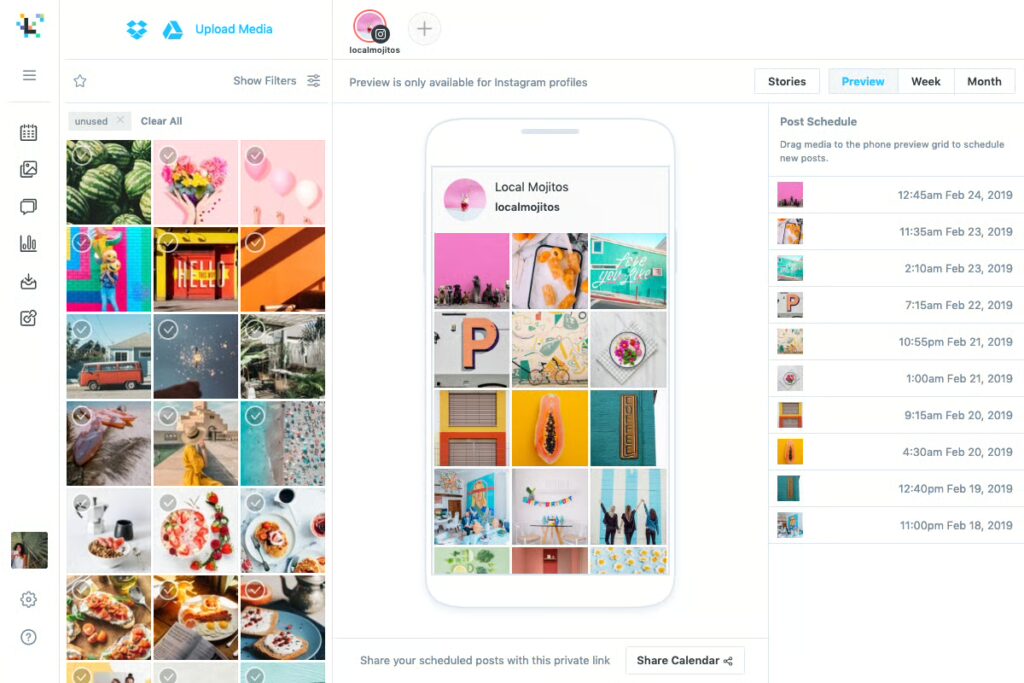
Image Source: Later.com
Later is known for its focus on visual content, especially Instagram.
Originally built for Instagram scheduling, Later has expanded to include other platforms like Facebook, Twitter (X), LinkedIn, and Pinterest.
Key Features:
Visual content planner: Later’s drag-and-drop planner is great for organizing Instagram grids and other visual content.
Instagram-first scheduling: While Later now supports multiple social platforms, it’s still strongest when it comes to Instagram, with tools like auto-publishing and hashtag suggestions.
Instagram analytics: Later offers insights into engagement metrics, follower demographics, and optimal times to post, helping you refine your Instagram social media strategy.
Linkin.bio: This feature lets you create a clickable link in your Instagram bio, directing followers to a curated landing page, which is ideal for driving traffic to specific content or products.
Pros:
- Simple visual Planner: The drag-and-drop interface makes it easy to schedule content and preview social media posts, especially for Instagram-heavy strategies.
- Budget-friendly: Later’s pricing makes it accessible for small businesses and freelancers focused on visual content.
- Specialized for Instagram: If Instagram is your main platform, Later offers specific tools that cater to its unique needs.
Cons:
- Limited analytics for other platforms: While great for Instagram, Later’s social media analytics are more basic for platforms like Twitter (X) and LinkedIn.
- Not ideal for text-based platforms: Later’s focus on visual content makes it less useful for platforms where text-based content is key, such as LinkedIn.
Pricing:
Later offers two main plans for individuals and small teams, agencies and enterprises.
The Starter plan is $16.67 per month (billed yearly) or $25 monthly, while the Growth plan is $30 per month (billed yearly) or $45 monthly, both with access to a varying number of social sets and users.
6. Zoho Social
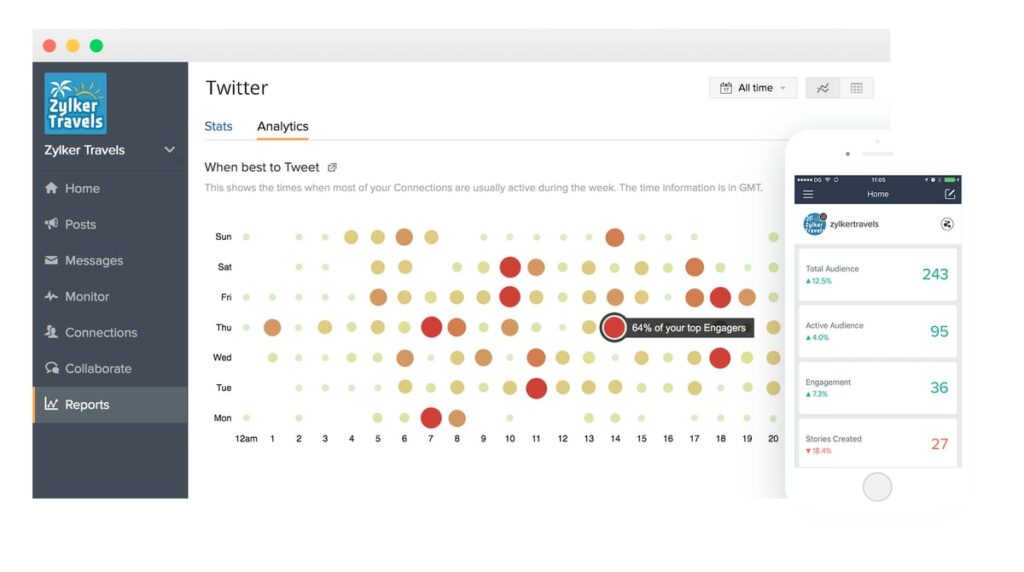
Image Source: Zoho.com
If you’re already using Zoho’s suite of business tools, Zoho Social is a good choice for managing your social media accounts.
It integrates seamlessly with other Zoho products, making it suitable for businesses that want a unified approach to their operations.
Key Features:
Cross-platform scheduling: Schedule posts for Facebook, Instagram, Twitter (X), LinkedIn, and Google My Business, all from one platform.
Custom reporting: Zoho Social’s reports are customizable, allowing you to focus on the metrics that matter most to your business.
Bulk scheduling: Upload multiple social media posts at once and schedule them ahead of time to save time and effort.
Social listening: Monitor keywords, hashtags, and mentions in real time, ensuring you stay on top of important conversations.
Collaboration tools: Assign tasks, review drafts, and approve posts, making it easy for teams to collaborate efficiently.
Pros:
- Great for Zoho users: If you’re already using Zoho products like Zoho CRM, Zoho Social integrates smoothly, offering a unified platform for managing both business and social media tasks.
- Affordable: Zoho Social offers competitive pricing, making it accessible for small businesses.
- Customizable reports: Tailor your reports to track the most relevant social media analytics.
Cons:
- Limited features in basic plans: Some advanced features, like custom reports and in-depth analytics, are only available in higher-tier plans.
- Basic interface: While functional, Zoho Social’s interface isn’t as sleek as other tools on the list.
Pricing:
Zoho Social offers three pricing tiers. The Standard plan costs €15 per month, the Professional plan is priced at €40 per month, and the Premium plan is available for €65 per month.
7. Planable
Planable is a social media collaboration platform designed to simplify content planning, approval, and publishing. Its user-friendly interface and teamwork-focused features make it a suitable choice for businesses, agencies, and social media teams that want a smoother workflow.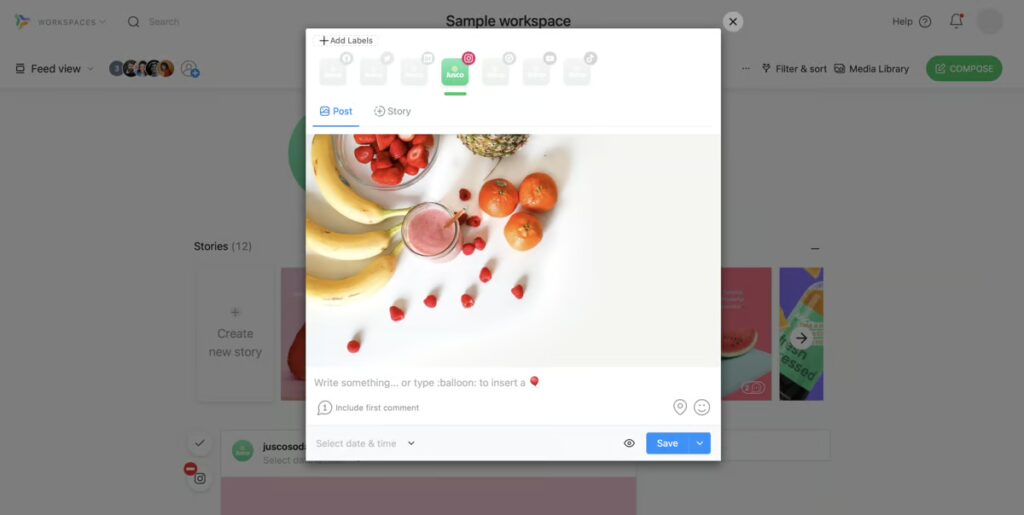
Source: G2
Key Features
- Visual content calendar: A drag-and-drop calendar that lets you organize and schedule posts across multiple social platforms.
- Real-time collaboration: Team members can leave feedback, approve posts, and make edits directly within the platform.
- Multi-platform support: Supports scheduling for Facebook, Instagram, X, LinkedIn, and Google My Business.
- Approval workflows: Customizable approval processes to make sure posts meet brand standards before publishing.
- Accurate post previews: Displays posts exactly as they will appear once published.
Pros
- Designed for collaboration, allowing teams to work efficiently on content approvals.
- Intuitive and easy to use to make content management simple for social media teams.
- Provides accurate previews of posts to make sure content looks right before publishing.
Cons
- Limited analytics features, which may require an additional tool for performance tracking.
- Per-user pricing can get expensive for larger teams managing multiple accounts.
Pricing
Planable’s Basic Plan costs $39 per user/month and includes a single workspace, four connected pages, and up to 60 posts per month. The Pro Plan is priced at $59 per user/month, offering ten connected pages, 150 posts per month, and extra features like grid view and extended version history.
For larger teams, the Enterprise Plan provides unlimited posts, pages, and premium features like multi-level approval workflows and dedicated support, with custom pricing based on business needs.
8. SocialBee
SocialBee is a social media management tool designed to help businesses and individuals create, schedule, and analyze content across multiple platforms. It offers automation features while keeping content fresh and engaging.
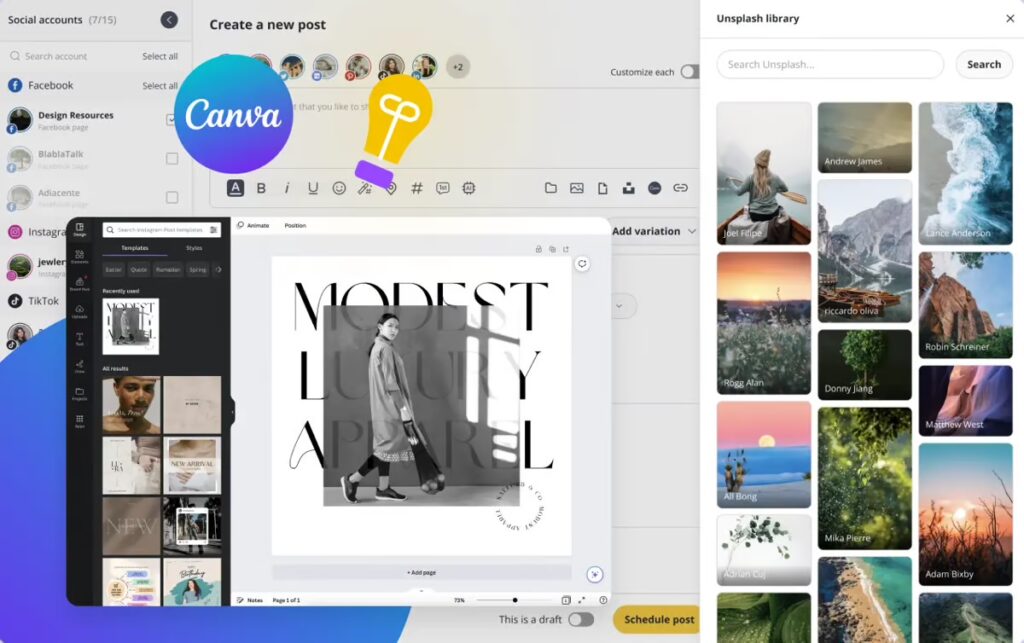
Source: G2
Key Features
- Content categories: Organize posts into categories to maintain a balanced content mix and keep your feed diverse.
- Bulk scheduling: Plan and schedule multiple posts at once to save time.
- Multi-platform support: Schedule content for most social media platforms like Facebook, Instagram, X, LinkedIn, Pinterest, Google My Business, and TikTok.
- Post recycling: Automatically re-share evergreen content while avoiding repetitive posting patterns.
- Analytics and reporting: Get insights into engagement, audience growth, and post performance.
Pros
- Offers a category-based scheduling system that makes content organization easier.
- Provides post recycling to maximize the reach of evergreen content.
- Supports a wide range of social media platforms, making it versatile for different users.
Cons
- The interface takes some time to get used to, especially for new users.
- Analytics features are not as advanced as some other social media management tools.
Pricing
SocialBee’s Bootstrap Plan costs $29 per month, providing essential scheduling tools for individuals and small businesses. The Accelerate Plan is priced at $49 per month and offfers more automation features for growing teams.
The Pro Plan costs $99 per month and is designed for larger teams and agencies that need advanced social media management capabilities.
9. Google Analytics
Google Analytics is a free web analytics tool that helps businesses track and analyze website traffic.
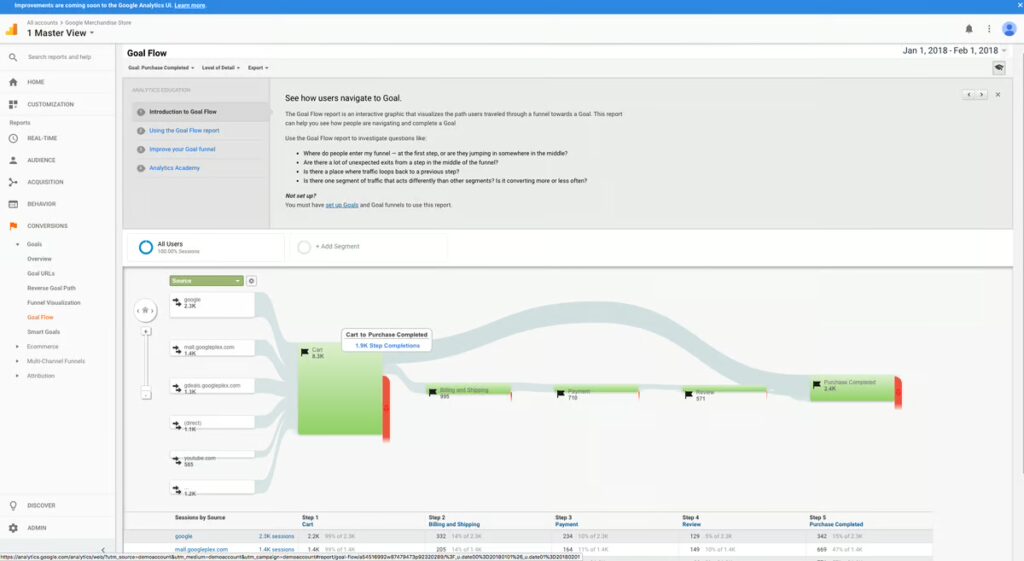
Source: G2
While it has some limitations, it provides valuable insights into user behavior, which makes it a great option for businesses looking to optimize their marketing and website performance without additional costs.
Key Features
- Comprehensive reporting: Tracks user demographics, behavior, and acquisition channels to help businesses understand how visitors interact with their sites.
- Real-time data: Monitors live user activity, offering immediate insights into website performance and engagement.
- Conversion tracking: Allows businesses to set goals and track specific user actions like purchases, sign-ups, or downloads.
- Integration with Google services: Works with Google Ads, Search Console, and other platforms for a unified marketing strategy.
- Custom dashboards: Allows businesses to create personalized dashboards that focus on the most relevant metrics.
Pros
- Offers detailed insights into user behavior and website performance.
- Provides real-time tracking to measure campaign effectiveness instantly.
- The free version includes powerful analytics tools suitable for most businesses.
Cons
- Can be overwhelming for beginners due to its complexity.
- Some reports use data sampling, which may limit accuracy for high-traffic websites.
Pricing
Google Analytics offers a free version with features that cater to small and medium-sized businesses.
For larger enterprises, Google Analytics 360 provides additional features like unsampled reports, advanced integrations, and higher data limits. Pricing for Analytics 360 is customized based on business needs.
10. CoSchedule Social Calendar
CoSchedule Social Calendar is a social media scheduling tool designed to help businesses and marketers plan, automate, and manage their social media content from a single platform.
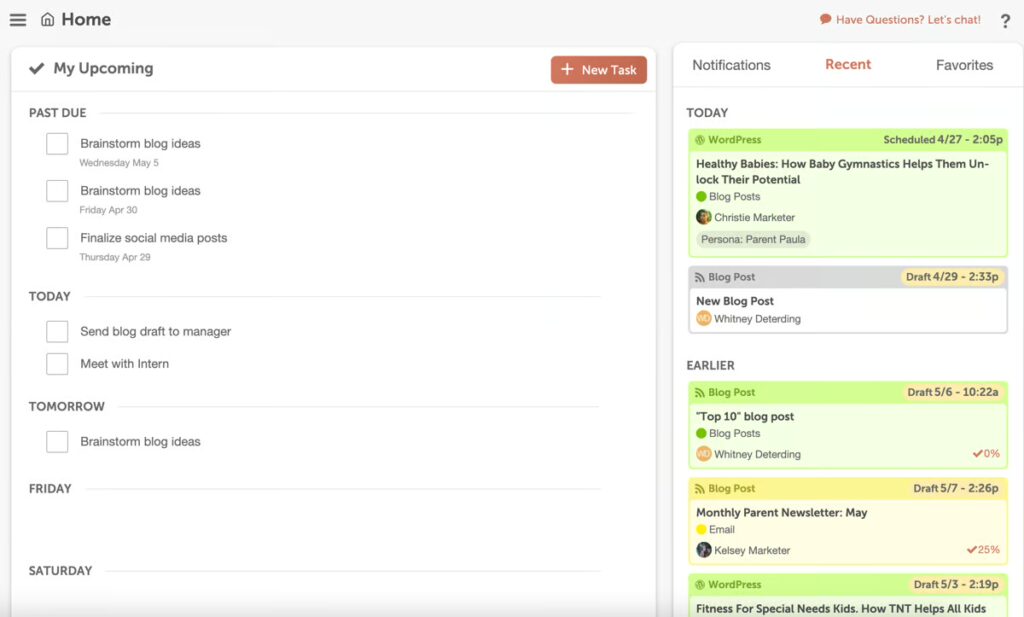
Source: G2
It gives users a structured approach to scheduling while keeping content organized and consistent across multiple channels.
Key Features
- Drag-and-drop social calendar: A visual calendar that allows users to plan and schedule social media posts with ease.
- Bulk scheduling: Upload and schedule multiple posts at once to maintain a steady content flow.
- ReQueue™ automation: Automatically reshares top-performing posts to keep social channels active.
- Social media integrations: Supports scheduling for Facebook, Instagram, X, LinkedIn, and Pinterest.
- Performance analytics: Tracks engagement and provides insights into post effectiveness.
Pros
- Offers a structured and organized approach to social media scheduling.
- Automates post recycling to keep content fresh without extra effort.
- A user-friendly interface makes content planning simple.
Cons
- Lacks in-depth analytics compared to more advanced social media tools.
- Pricing is per user, which may get expensive for larger teams.
Pricing
CoSchedule Social Calendar starts at $29 per user/month, which offers unlimited social media publishing, bulk scheduling, automation, and integrations with major platforms. It provides a structured solution for businesses looking to keep their social media management in one place.
11. Agorapulse
Agorapulse is a social media management tool built for businesses needing more than basic scheduling.
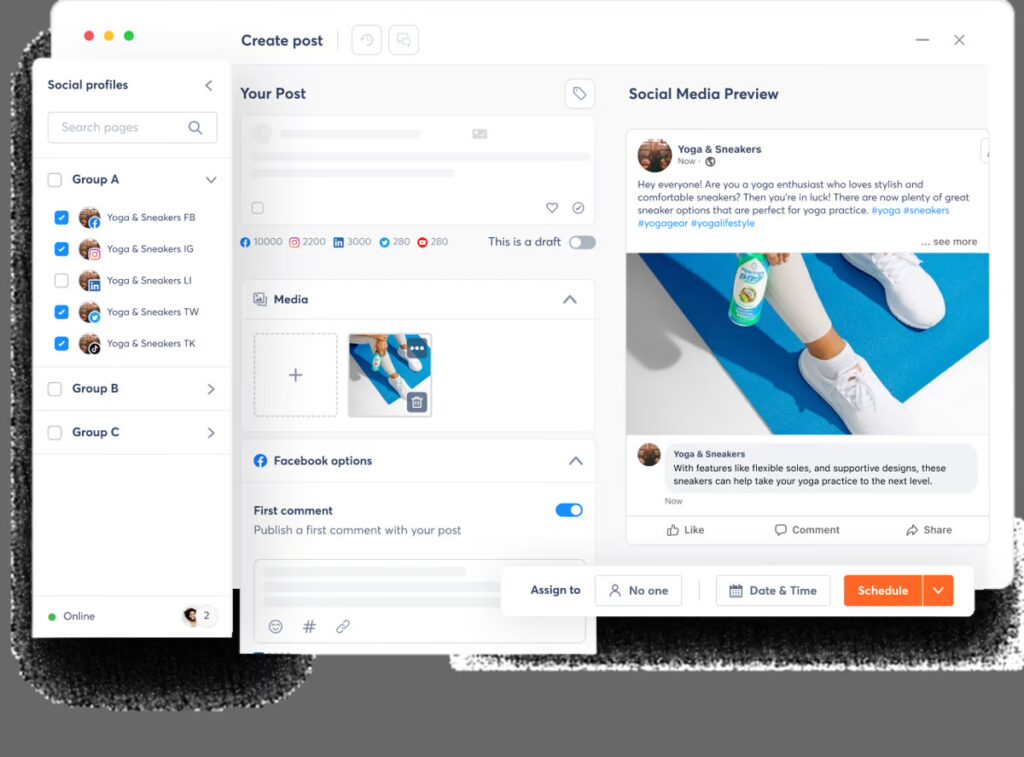
Source: G2
With a focus on engagement, collaboration, and in-depth reporting, it helps brands stay on top of conversations, schedule content efficiently, and measure social media success—all from one centralized platform.
Key Features
- Unified social inbox: Consolidates messages, comments, and mentions from various platforms into a single inbox for easy management.
- Content scheduling and publishing: Allows users to plan, schedule, and publish posts across Facebook, Instagram, X, LinkedIn, and YouTube.
- Social listening: Monitors brand mentions, keywords, and hashtags to keep track of relevant conversations.
- Analytics and reporting: Provides detailed insights into engagement, audience demographics, and content performance.
- Team collaboration: Assign tasks, set roles, and streamline content approvals for an efficient workflow.
Pros
- A centralized inbox makes managing social interactions easy.
- Advanced reporting helps track engagement and audience trends.
- Built-in collaboration tools simplify team workflows.
Cons
- Higher pricing may not suit smaller businesses.
- A steeper learning curve due to its range of features.
Pricing
Agorapulse offers a Free Plan with basic scheduling for up to three social profiles. The Standard Plan costs $99 per month and supports ten profiles plus unlimited post scheduling.
The Professional Plan is priced at $149 per month, adding team workflows and advanced analytics. For businesses needing bulk publishing, content libraries, and deeper social listening, the Advanced Plan costs $199 per month.
12. Sendible
Sendible is a social media management platform designed to help businesses, agencies, and marketers efficiently plan, schedule, and analyze their social media content across multiple channels.
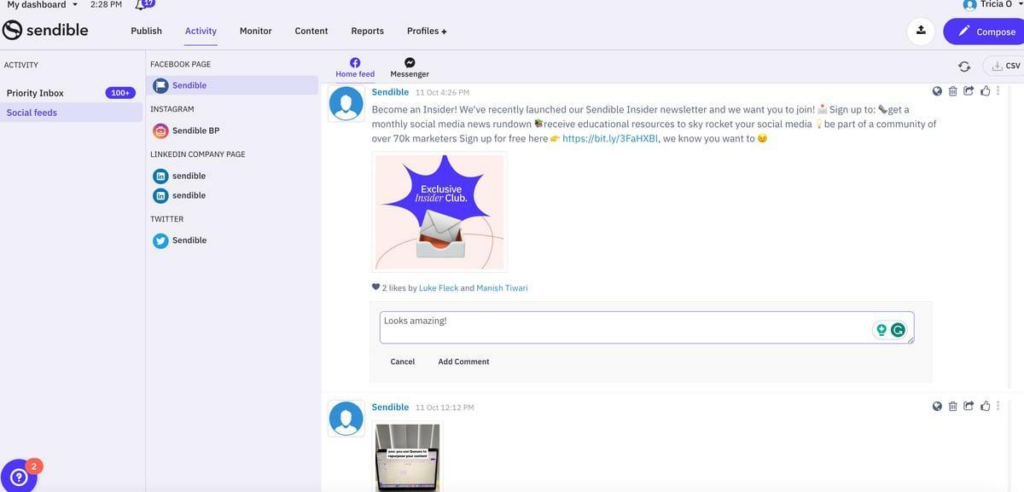
Source: G2
Key Features
- Smart compose box: Craft and customize posts for various social media platforms. Includes features like an emoji picker, hashtag suggestions, and image editing tools.
- Content calendar: A visual calendar that provides an overview of scheduled posts for easy drag-and-drop rescheduling and campaign planning.
- Social listening: Monitor brand mentions, keywords, and hashtags to stay informed about relevant conversations and trends.
- Team collaboration: Facilitate efficient teamwork with features like user roles, approval workflows, and shared content libraries.
- In-depth analytics: Access detailed reports on post performance, audience engagement, and growth metrics to inform strategy adjustments.
Pros
- Designed for ease of use so it’s accessible for users of varying technical expertise.
- Combines multiple social media management functionalities into one platform
Cons
- May be on the higher end for small businesses or individual users with limited budgets.
- The extensive range of features may require time for new users to fully explore and utilize effectively.
Pricing
Sendible offers a Creator Plan at $29 per month, which includes the management of six social profiles and one user, suitable for individuals or small teams. The Traction Plan is priced at $89 per month, supporting 24 social profiles and four users, suitable for growing teams.
For larger teams, the Scale Plan costs $199 per month, offering 49 social profiles and seven users. There’s also the Enterprise Plan for companies with more extensive needs, available for $750 per month.
13. Iconosquare
Iconosquare is a social media analytics and scheduling tool built for brands and agencies that want deeper insights into their social media performance.
![]()
Source: G2
Unlike basic scheduling tools, it focuses on data-driven decision-making to help businesses maximize their content strategy with advanced analytics and reporting.
Key Features
- Advanced analytics: Provides in-depth insights on follower growth, engagement rates, and content performance.
- Scheduling and publishing: Allows users to plan and automate posts across multiple social platforms.
- Social listening: Monitors brand mentions, keywords, and hashtags to track relevant conversations and industry trends.
- Team collaboration: Includes user roles, approval workflows, and shared content libraries for seamless teamwork.
- Competitor tracking: Analyzes competitor performance to help businesses benchmark their social media efforts.
Pros
- Offers in-depth analytics that go beyond basic engagement metrics.
- Provides competitor tracking to help brands refine their strategy.
- Supports multiple platforms, which makes it suitable for agencies managing several accounts.
Cons
- Pricing may be high for small businesses.
- Some features, like in-depth reporting, are only available in higher-tier plans.
Pricing
Iconosquare’s Launch Plan ranges from $39 to $77 per month, supporting up to ten social profiles with 12 months of data retention. The Scale Plan is available for €83 to $383 per month, allowing up to 30 social profiles and 24 months of data retention, plus additional features.
14. Statusbrew
Statusbrew is a social media management platform built for teams that need more than just scheduling. This tool focuses on collaboration, automation, and analytics so businesses can speed up content planning, manage engagement, and track performance more easily.
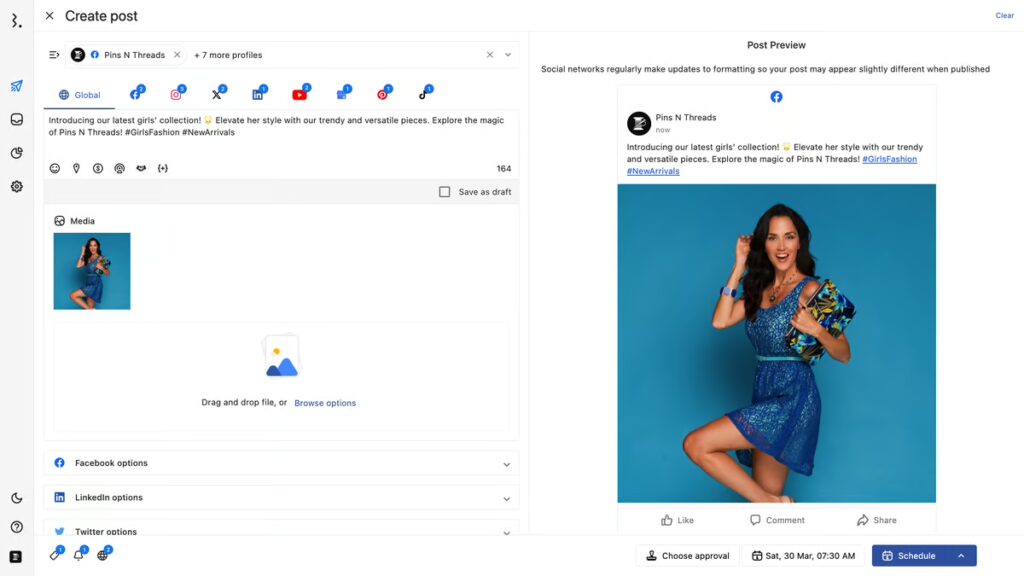
Source: G2
Key Features
- Unified social inbox: Brings all messages, comments, and mentions into one inbox for easy engagement management.
- Advanced scheduling: Supports post scheduling across multiple platforms, including Instagram Reels, Stories, and LinkedIn articles.
- In-depth analytics: Tracks over 230 social media metrics to measure performance and optimize content strategy.
- Team collaboration: Offers approval workflows, user roles, and shared content calendars for efficient teamwork.
- AI-powered tools: Generates captions, suggests hashtags, and provides content recommendations to improve reach.
Pros
- Combines publishing, engagement, and analytics in one platform.
- AI-powered content suggestions help streamline post creation.
- Customizable workflows make collaboration easier for teams.
Cons
- Pricing may be high for small businesses.
- The wide range of features can take time to master.
Pricing
Statusbrew’s Lite Plan costs $89 per month, which comes with essential scheduling and engagement tools for small teams. The Standard Plan is priced at $179 per month, adding advanced analytics, additional user seats, and priority support.
15. Social Champ
Social Champ offers social media managers a comprehensive platform that simplifies content scheduling, engagement, and analytics across multiple social networks. Designed with user-friendliness in mind, it caters to businesses, marketers, and agencies aiming to optimize their online presence.

Source: G2
Key Features
- Multi-platform scheduling: Plan and schedule posts across various social media platforms, including Facebook, Instagram, X, LinkedIn, and more.
- Content calendar: Use a visual calendar to organize and manage your content strategy, with drag-and-drop functionality for easy rescheduling and planning.
- Analytics and reporting: Access detailed analytics to monitor post performance, audience engagement, and growth metrics for data-driven decision-making.
- Team collaboration: Collaborate efficiently with team members through features like role assignments, approval workflows, and shared content libraries.
- Social inbox: Manage all your social media interactions in one place, responding to comments, messages, and mentions seamlessly.
Pros
- Accessible for users of varying technical expertise.
- Combines multiple social media management functionalities into one platform
Cons
- May be on the higher end for small businesses or individual users with limited budgets.
- The extensive range of features may require time for new users to fully explore and utilize easily
Pricing
Social Champ offers a Free Plan that allows users to manage up to three social media accounts with basic features. For more advanced needs, the Champion Plan is available at $29 per month, supporting up to 12 social accounts and offering features like bulk scheduling and analytics.
The Business Plan is priced at $99 per month, accommodating up to 40 social accounts and including team collaboration tools. For larger organizations, the Agency Plan is offered at $299 per month, providing management for up to 100 social accounts, advanced analytics, and priority support.
Manage Your Social Media With DGTLsuite’s Scheduling and Analytics
Struggling to keep up with your social media posts and performance?
DGTLsuite takes the hassle out of social media management by combining powerful social media scheduler features and in-depth analytics in one platform.
More than just managing posts, DGTLsuite allows you to plan your content in advance and track how each piece performs with detailed insights.
From scheduling posts to analyzing audience engagement, DGTLsuite makes sure you have all the tools you need to stay on top of your strategy.
Imagine effortlessly managing your content calendar, optimizing your posting times, and using comprehensive analytics to fine-tune your approach.
Whether you’re running a small business or a larger team, DGTLsuite gives you the clarity and control you need to elevate your social media efforts.
Ready to simplify your social media scheduling and get deeper insights?
Book a discovery call today and find out how DGTLsuite can help you boost your strategy and results.
FAQs About Social Media Scheduling and Analytics Tools
What are social media scheduling tools?
Social media scheduling tools allow you to plan and schedule posts across multiple social media channels in advance, ensuring your content is published at optimal times without having to manually post every day.
Tools like DGTLsuite make scheduling easy by supporting multiple social media platforms like Instagram, Facebook, Twitter (X), LinkedIn, and more.
What is the best social scheduling tool?
DGTLsuite stands out as a top choice for social scheduling, offering a user-friendly interface, multi-platform support, and advanced features like bulk scheduling and a visual content calendar.
Which social media management tool has the best analytics?
For comprehensive social media analytics, DGTLsuite provides in-depth insights into audience engagement, social media post performance, and trends, helping you refine your strategy based on real data.
Is Hootsuite a social media analytics tool?
Hootsuite is primarily a social media management tool rather than a dedicated analytics platform. However, it does offer social media analytics features that allow users to track engagement, monitor performance, and generate reports.
Is there a free social media scheduling tool?
Yes, there are free social media scheduling tools with basic features, but for more advanced social media scheduling and analytics capabilities, DGTLsuite offers flexible pricing plans, along with a free trial, so you can explore its full potential before committing.
